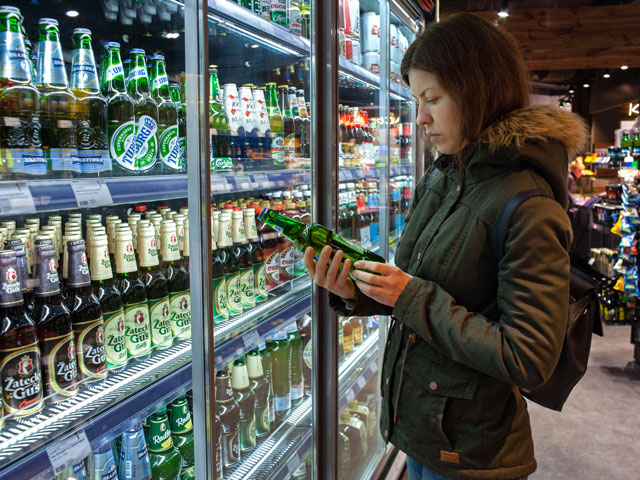What is the Shelf Life of Beer? Does It Have An Expiration Date?
As sad as it sounds, most beers won’t last forever in the same condition, and with the same taste and color, as when you first purchased them. So does beer expire or does it just go bad sometimes? Let us explain the ins and outs of aging beer, and discuss how to store it properly.
Written by CraftJack | Updated | 6 min read
Interesting Tools
- Beer BrüMate Hopsulator
- Brewing Northern Brewer Beer Making Kit
- Spirit Crystal Whiskey Glasses
- Wine Wine Decanter/Aerator

All in all, beer usually won’t spoil in the sense that it will be completely unsafe to drink. But yes, beer can expire in very unfavorable conditions, including exposure to direct sunlight, too much oxygen, or bacteria. UV rays can react with the hops compounds in your beer and make the beer go bad and lose the taste you love.
Oxidation can affect the aroma of your beer over time. The most common unfavorable form of too much oxygen is called diacetyl, a chemical reaction with two negative impacts. One is that it can make your beer taste buttery. The second and worse impact is that it can potentially cause lung disease.
Alcohol is a natural preservative that kills many microorganisms. However, bacterial issues can still occur depending on how the beer is manufactured and stored. If your alcohol tastes funny, it’s best to leave it alone.
However, even if they haven’t necessarily “spoiled’ or even “expired,” some types of beer can go bad. As in, even if they are not expired, they might still not taste how you want or expect them to taste.
The taste can because for most beer styles, fermentation continues even after the bottled beer or beer can has been sealed.
Table of Contents
- How Long Does Beer Last? How Long is it good for?
- How to Know If Beer Is Bad
- How to Store Beer Properly
- Risks of Drinking Expired Beer
How Long Does Beer Last? How Long is it good for?
Although beers might not last forever, they still have a longer-lasting shelf life than many other consumable grocery store items. Most beers will stay as good as new for up to six months at room temperature, at least when it comes to the best cheap beers. And, if you have room in your fridge for this long, you can store beer in there for up to one whole year!
Further, not all beer is packaged as effectively as others when it comes to their potential lifespan. Canned beers, for example, often last longer because they are better at blocking UV ray exposure than bottled beers. And of course, once you open a an IPA or Imperial Stouts, the taste and overall enjoyment of it can decrease within hours. For instance, if you’ve tried to sip an unfinished beer the following morning, you already know that leaving it in the fridge might extend its lifespan, but only for a day tops.
Not all beers are created equally, either. Unpasteurized beer will only last a few weeks at room temperature, such as in the pantry. On the other side of the coin, vintage beers that are made for aging are a significant exception to the rule. They can last for five to ten years at room temperature!
How to Know If Beer Is Bad
Because beer does not always expire on the listed expiration date, and there are external factors that can cause it to go back, it might be deemed undrinkable at any moment. This is why it is helpful to understand how to know if a beer has gone bad.
Taste
If you drink beer, you may enjoy the alcohol content alone. But most craft beer drinkers also very much enjoy the taste. Even if you’ve only had your beer for a few weeks, if it tastes like old beer, it’s probably not fresh!
Smell
If your beer smells skunky, it is probably not dangerous. However, it's possible that it has been exposed to too much direct sunlight. In this case, you will know that the beer is undrinkable and might avoid tasting it altogether. An exception to this rule is a lager like Heineken, in which the colored beer bottles give it a specific smell that is actually desirable to some consumers. Note - fresh Heineken is not skunked beer.
Color
It might be difficult to tell with darker beers such as stouts, but when pale ales and other lighter beers turn darker, this is a sign that it is likely no longer fresh beer.
Foam
Nobody likes a poured beer that is half beer, half foam. But some foaming at the top is a good sign. The lack of foaming and lack of carbonation in general means that your beer is flat and no longer desirable for drinking.
Opening Sound
Many beer drinkers love the psst sound of cracking open an unopened can of beer. If you don’t hear this sound, that likely means this beer has gone sour, stale, or even rotten.
Appearance of Bottle
If the bottled beer is too dusty or leaky, or if the label is discolored, this is not a beer you want to pick up and drink. This is especially true if you see dusty sediment on the inside. Not worth it!
Dark bottles might be the exception to the rule.
How to Store Beer Properly
The best place to store beer is in a dark and cold area. A pantry, a fridge, a cellar, and even a freezer are all great options for storing your beer, depending on the length of time in which you are looking to keep the beer.
Storing Beer in a Pantry
A pantry is a great storing option for beer because it keeps your beer away from UV rays. As mentioned, direct sunlight, or more specifically, UV light (ultraviolet) can negatively affect the flavor and even the hops of your favorite beer, just like it can with barley wines.
Storing Beer in a Cellar
Storing beer in a cellar is an excellent idea, especially if you live in a warmer climate since the average temperature of a cellar is between 50 and 55 degrees Fahrenheit (or 10 to 13 degrees Celsius). Higher temperatures can impact the taste of beer over time, so a cold cellar is a great way to combat this aging process and slow it down.
One thing you want to make sure of when storing beer in a cellar is to keep your beer upright. This is more about making sure beer bottles don't roll off a shelf than anything else. Spilled alcoholic beverages in the cellar can go unnoticed for days, weeks or months at a time. Plus, now you just lost out on the 4-pack of hoppy beers you bought from the local craft beer cellar.
Storing Beer in a Fridge
A fridge is another great option for those living in places with warmer temperatures. It is often a more accessible storing option as well, as many people do not have cellars in their homes.
Additionally, a fridge is typically even colder than a cellar. It would be best if you kept the temperature between 35 to 46 degrees Fahrenheit (or 1.7 to 7.8 degrees Celsius) for the slowest aging process. Finally, a fridge protects the beer from direct sunlight as well. Win-win!
Plus, beer fridges aren't too expensive to order up on Amazon. Check out some Amazon beer fridges.
Storing Beer in a Freezer
If you are planning on quaffing the beer soon but would still like to store it appropriately to make sure the taste is as fresh as possible, a freezer is a good option. Avoid doing this with glass bottles, as if you leave it in for too long, the pressure from the freezing — thus expanding — beer may cause the bottle to break.
Beer will not freeze as quickly as water, given the alcohol content (ABV) and sugar content. However, beer still has ample water in it, as opposed to hard liquor. Thus, you should avoid keeping it in for too long, or it will freeze and then need to be thawed out. This process will end up affecting the flavor, which of course, defeats the purpose of good storage.
Storing Beer With Good Packaging
Many people consider where to keep the beer in terms of location, but bottling and packaging are things to consider when storing - and purchasing - your beer as well.
First, you want bottles and cans that limit direct sunlight exposure. This means that you should opt for darker bottles and cans — like black, gray, or brown bottles (dark bottles). If you are looking to store beer for a longer period of time, avoid using or purchasing glass bottles, especially green and clear bottles. This is how you end up with skunked beer, as light will seep into the bottles if stored in direct sunlight.
Secondly, you want bottles and cans that limit oxidation. Get bottles and cans that are sealed tightly in order to limit air leakage. Also, it is best to store your bottles upright in order to keep the surface area in contact with the air as small as possible.
Storing beer in a keg is also a winning idea, as it is a dark place for your beer. Just make sure that it is a good, tightly sealed keg. You can get tightly sealed kegs from reputable brewers.
Risks of Drinking Expired Beer
The most common risk of drinking expired or undrinkable beer is that it will leave a sour or unfavorable taste in your mouth. The fermentation and low pH in alcohol keep it from being very dangerous to drink, even if it does not taste very good.
However, some breweries may not have high-quality standards. They may use contaminated or dirty equipment when making and processing the beer. If that’s the case, you risk drinking more than just bad beer - you risk drinking bacteria, microorganisms, and other impurities that can cause stomach aches or nausea.
This is why it’s best to check the non-tasting signs of bad beer before consuming it, such as the “best before” or “best by” date on the packaging. If you do sip it and it doesn't taste nice, simply throw it away. It’s not worth the risk!
Wrapping things up
Beer is a great drink that has brought people together and lifted spirits for ages. But it does not always last as long as people think. Beer can, in unfavorable conditions, expire or otherwise be gross to drink.
It is rarely dangerous to drink bad beer, but you want to avoid the possibility of doing so by looking and smelling it first. The best thing to do is prevent beer from becoming rotten by storing it appropriately - namely, in a cold or dark place.
